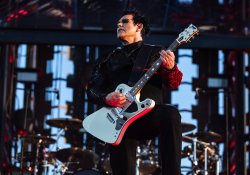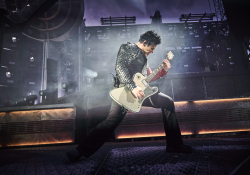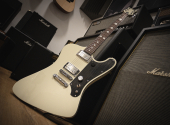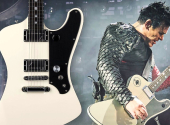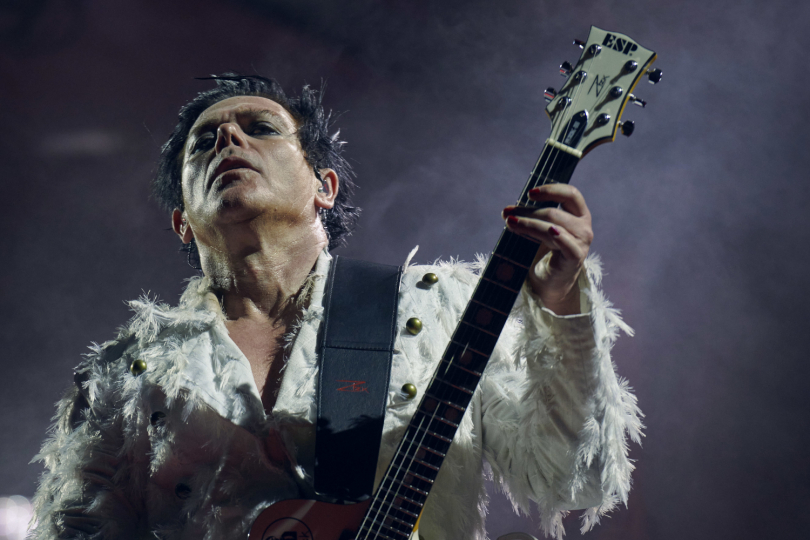
Richard Kruspe (Rammstein): Every Environment Brings Out a Different Way of Creation
He is best known for his work with the famous Rammstein, with whom he celebrated their 30th anniversary last year, but he also finds a place for his musical ideas in the successful project called Emigrate. With his distinctive sound, Richard Kruspe is certainly one of the most influential guitarists in the rock world today. He has worked with the ESP guitar company for many years, and this year they introduced Richard's latest signature model, the ESP RZK-III. In an exclusive interview with Insounder.org, Richard revealed the background of the creation of this guitar and we also discussed his musical beginnings and what's going on in both of his bands.
You've been working with ESP since 1996 if I'm not wrong. Do you remember how your cooperation started?
I remember that I fell in love with one ESP guitar. It was the first time and the last time I went to the music convention in Frankfurt. I saw the ESP-901 and I was sneaking around the ESP booth like a tiger waiting for the catch. I borrowed the guitar and later on, in the early days of Rammstein, I started to use KH guitars from ESP because I was looking for a guitar that has a fast attack. It also had Floyd Rose. Then I started working with Stefan from Sound Service, tried different guitars and when the band got bigger I thought I would like to have a signature model. That’s how it all started.
Now you've put together your new signature model, the ESP RZK-III. How long have you been working on it?
It’s been quite a while. People think that it’s an easy thing to do but just the way of moving prototypes from Japan to Germany takes some time. I think it started in 2021. I was doing a video for my solo project Emigrate and I was looking for a different kind of shape, something more 70s, kind of Firebird. And Phoenix ESP fit into my imagination. Normally I would sit when I wanted to try a new guitar but this time I was standing, playing it live. It had a very masculine sight to it I would say. It was one of those straightforward guitars that you want to rock on. I fell in love with that shape and that’s where the idea to create the RZK-III was born. Every guitar has a different synergy with you. It’s like a kiss. A kiss is a kiss but always feels different with each person you kiss. (laughs)
The headstock is not like the Phoenix models though. What was the main reason for that change?
First of all, the main reason was that I thought it was too long. (laughs) Somehow it didn’t really fit my idea of how the guitar should look. I felt that I wanted to change the headstock. I used the headstock that I already had on my signature guitars. A lot of people would say: "No! You can’t do that. You can’t change this original feature." But I felt like that’s the idea of signature guitars. You can do anything you want. We ended up having some problems because one of the reasons that the previous headstock was so long was to create the balance between the body and the neck. But somehow we managed to balance the guitar with the headstock we have now.
I think it looks better now.
(Laughs) It’s always the same. People say that you can’t do it but after a while it’s like: "You know what? It looks kind of good actually." I’m loving it but it is a very individual taste I guess. That’s what you do with signature guitars, you try out things first for yourself and then you hope that other people might like it too.
Did you try to go the experimental way in anything?
Things that I did were certain kinds of ideas that I wanted like to try. In the old days I was playing with an e-bow kind of thing, that’s why I was thinking about using a sustainiac pick-up for the ESP version. I don‘t do it so much on stage, I‘d rather play this kind of stuff in the studio to experiment. I also felt I would like to have a killswitch. Killswitches that you normally have are done the old Gibson way, nowadays they are doing it with the button. I have the German way and the American way. The difference between those is that with the American way you first have the sound and you kill the sound while you push the button. The German way is, you have no sound and when you push the button, you create the sound. It is a different way of playing with rhythm.
There were other things that we had to come up with. Because I’m so used to playing with a Floyd Rose I said: "Let’s make a tryout with three different bridges." So we created three different prototypes, with a stop tailpiece, a Floyd Rose and a string-through body bridge. We did the tryout only by sound and it turned out that the stop tailpiece was the winner. This created another problem because stop tailpieces normally come on Les Paul style guitars which have U profile necks, whereas I am used to playing on the type of guitar that comes with a Floyd Rose, where the distance between the neck and the strings is always a little more comfortable. That’s why we started to experiment to get the bridge into the body without losing the sound that I love too much.
We did it here in Berlin with a good friend of mine Alex who is a guitar builder. So I said to him: :Listen, I want to feel the idea of Floyd Rose on the left hand but still want to have the sound of the stop tailpiece." So we tried to combine those two concepts in one guitar. We created the version that we felt was a good compromise and we sent it back to Japan and they actually created the main guitar.
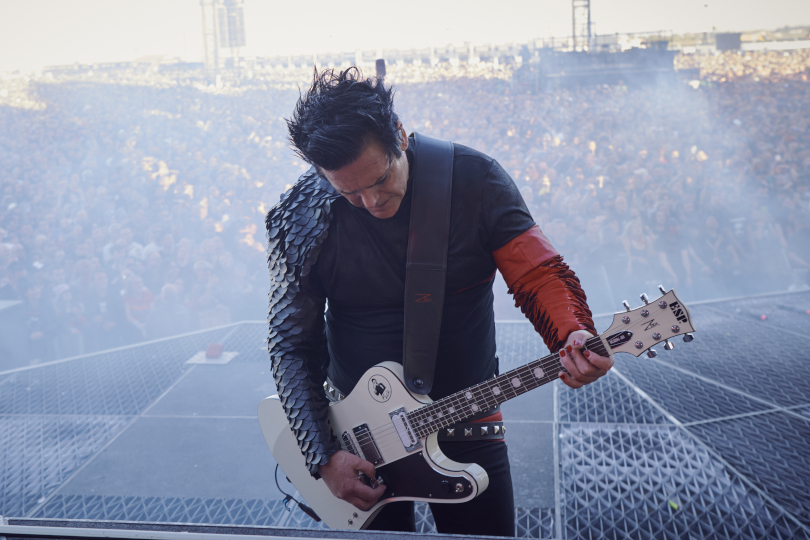
Now you use your signature Fishman RZK pickups, but in the past you liked the EMG 81 or 84 pickups. Did you consider those for the RZK-III?
One of the reasons that I changed from EMG to Fishman is that I had a little problem with the EMG 81. Some EMG pickups sound amazing and some of them not so much. So I was missing the consistency. That’s why I went to Fishman, because every pickup sounds the same and that’s something I need to rely on. I also created a certain kind of frequency that I always use when I record guitars, 1.2 and 3.2 kHz which I kind of boosted in that pickup. And of course, I would use that pickup in my signature guitar.
I think that in the past, with your first signature models, you were not satisfied with the price they were sold for, you found them expensive. Did you look also into this aspect of the RZK-III?
And it even got more expensive. I’m not happy about it, to be honest, and I had a lot of conversations with my guys here in Germany. They explained to me that prices are going up in general, on wood, construction, rent in Japan. I can’t really understand why the models are getting so expensive but I have to rely on their information. I was very interested in having an LTD version which has almost everything except the sustainiac pickup, which I feel is really unique to my taste, so I think that most people don’t really need it. I was trying to create a guitar that people would like even though it’s a signature model. A lot of people buy signature guitars because they are fans of your playing and your sound. But with the LTD version, I felt I would like to create something that is not so individual to my name, which has a certain kind of gimmicks that I have on the ESP version but for an affordable price. One of the biggest differences between ESP and LTD is that ESP models are created in the custom shop where one person works on the guitar while LTD models are created in a factory.
You grew up in East Germany, what were your early guitar influences? Did you have anyone you looked up to in your neighbourhood? Some local hero?
Not really a local hero. I still love the simplicity of AC/DC. It is a band that followed me my whole life. The funny thing is that I have a thirteen-year-old daughter and she listens to a totally different kind of music but every time I put on an AC/DC song, she rocks out. So it still works. I was inspired by Malcolm Young who I had an experience seeing him playing live on stage. The other guy I felt very inspired by was Jimmy Page from Led Zeppelin. Not only by his playing but also by his sound and his creative production. I didn’t really have a local hero because in East Germany there wasn’t such a thing as a rock guitarist. They always played in jazz bands. (laughs)
You bought your first guitar in Czechoslovakia, right? Do you remember what kind of guitar it was?
That’s true. It was an acoustic guitar and the reason why I bought it was not to play music but it was just a thing that I knew you couldn’t buy in East Germany. It was very difficult to find them. All my buddies were drinking beer at U Fleků pub. I never drink alcohol, I love time and money, so for me, it was just an idea of reselling the guitar. It turned out later that I started using that guitar. (laughs) It was a nice little accident that created lots of other things later.
Could you tell us something about the equipment you use in the studio and at gigs? I know you were a Mesa Boogie player for a long time, but in recent years you've been using a Kemper Profiler, is that right?
It’s a big difference right now. I still use my Rectifiers, especially for the crunchy kind of sounds. I still use big tube microphones like Neumann U87 and M149. I still have my little microphone robot in the studio to find the sweet spot for the mics. But I changed my live set-up to profiling amps like Kemper. The reason I did it was because I didn’t make a lot of friends by using my studio gear. It was so complicated. (laughs) I drove people crazy with that. After a while, I started to use profilers. I decided that it just made sense to have the same sound every day. Now I can concentrate more on playing rather than getting the right sound in my ears which I had to do before I started using profilers. I still have two amps playing for stage sound but mainly I listen to the profile. I create my own profile before I go on tour and each time I always create new ones which is also fun to do.
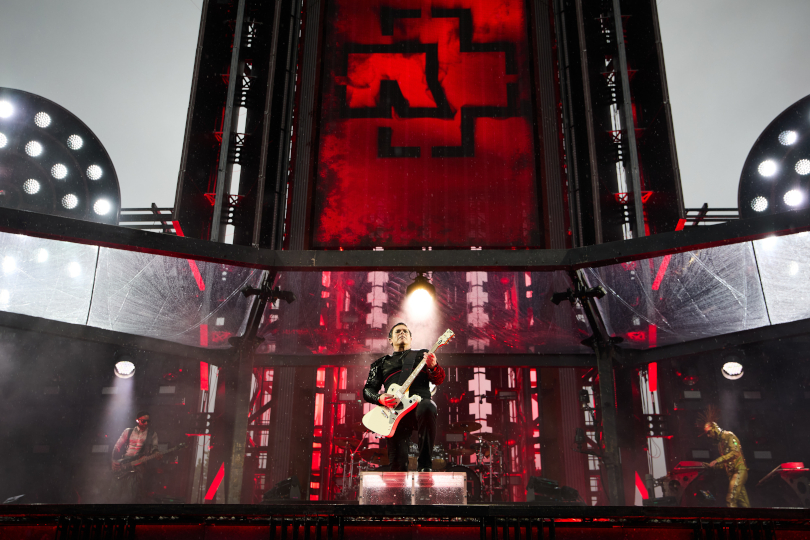
Do you have different gear for Rammstein and for Emigrate?
Not really. It is different playing with Rammstein, obviously, because there is another guitar player but it is pretty much the same. I use different pre-amps here and there but these are not major changes. Just minor little things.
I read in an interview that you have two studios at home. One upstairs in the penthouse, full of daylight. But also one darker.
Yes, it’s true. I love to write in different environments. I think every environment brings out a certain way of creation. It really depends on my mood. If I need to be a little bit darker or lighter. Every room creates a different kind of energy for you so you write different things and I love that.
Do you create songs mostly there or do you have instruments all around the house in case a riff suddenly comes to your mind?
I do have guitars all over the place. I have a piano in my living room which I play a lot. I have a guitar in my bedroom. I watch a lot of movies and sometimes I create my own soundtrack to the movies which is great and I like it. So I have instruments everywhere.
Do you have different songwriting processes for Rammstein and Emigrate? Or is it more like that when you're writing a song, you wait to see where the process takes you and then you decide which band the song will be for?
I remember, I think it was with the Deutschland record, I knew I needed to write more Rammstein songs and then I subconsciously went into that mode for Rammstein. But in general, there is no different process of writing. I just write and sometimes I think that the song would be more for this project or that project. When I play songs to the guys from Rammstein, they sometimes choose songs that I never thought they would choose. With Emigrate it is a little bit different because I start earlier to write vocal melodies and lyrics. With Rammstein, I try to leave it more open for Till because he has such a unique way of singing. But sometimes he takes my melodies and creates his own lyrics to it.
Emigrate released their last album in 2021. Usually, there's a 3-4 years gap between your albums. Isn't it time for another one?
Yeah, but you know. I don’t do music because there is a certain kind of time frame to it. That reminds me of the old East plan when every year you had to do certain things. I’m in a very privileged position that I don’t have to do that. But sometimes that is a bad thing because it is also good to know when you need to have things done. Sometimes you are in the mindset where you think too much about it. Should I do something, shouldn’t I do something. It is complicated to find the right balance. At the moment I have no plans. It is both a good and bad position at the same time.
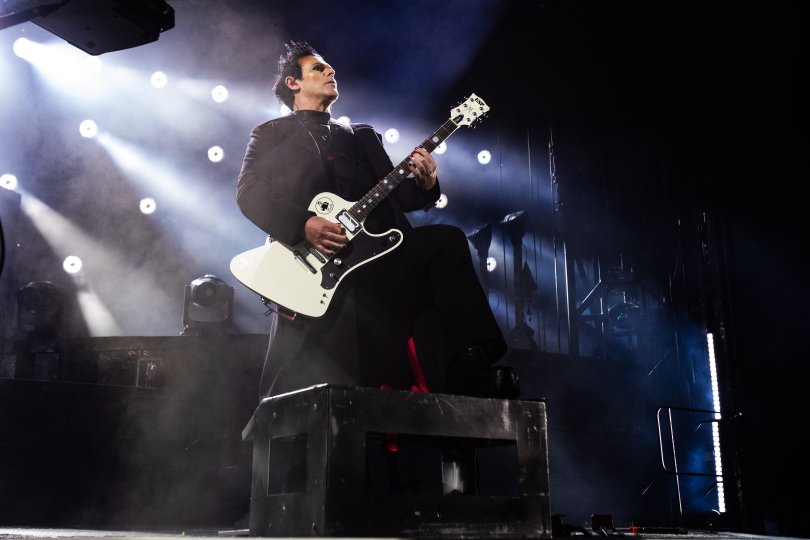
Emigrate were formed in New York, where you lived for a while. Was that also the reason why you chose to sing in English for this project? Wasn't there ever an idea to record something in German?
I have always been very attached to English music in general. That was something I've always felt most comfortable with. And living in New York, speaking the language, it was very organic to sing in English. I thought that it was important to me to have a different kind of take on my solo project than Rammstein. I have ideas in German, I don't push them away. If I thought they sound great, I would do the song also in German. I can do whatever I want but the main language in that project is English.
Did New York City influence your writing style in any way? Has it changed in any way after time you spent in the city?
I think that every city, every studio has an impact on the writing. I miss New York, to be honest. It has a certain kind of energy that Berlin doesn’t have. But now I’m living here in Berlin and it has other things that I appreciate.
The album Silent So Long from 2014 features Lemmy Kilmister among other interesting guests. How do you remember working with him? Could this collaboration be described as your dream come true?
There were a lot of stories about that project and bringing those people together but with Lemmy, it was the easiest of all of them. I have so much respect for that guy. I think it was one of the last songs that he sang in his life. He knew that he was sick and he couldn’t go to the studio. He just went there, took one take and that was it. I was so proud that he did that. There was no bullshit. It was so easy, straightforward, no drama. It couldn’t have been easier.
Is there anyone else you'd like to record a song with?
There are people like Martin Gore of Depeche Mode. He's always been on my list. I would like to do something with John Frusciante. The song has to fit that person. You have to think of them in a certain way. It always comes very naturally.
If you have found an error or typo in the article, please let us know by e-mail info@insounder.org.

